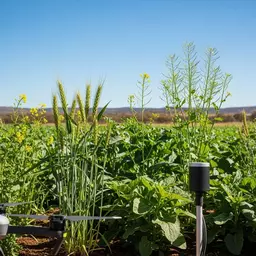Importance of Plant Science
- ✓ Food Security: Develops resilient crops.
- ✓ Biodiversity: Preserves native plants.
- ✓ Economic Growth: Boosts agricultural productivity.
As climate change challenges our agricultural systems, the role of plant science becomes increasingly vital. What if the future of our food security depended on understanding the resilience of our crops? This exploration not only influences farming practices but also impacts environmental sustainability and biodiversity. Let’s uncover the key insights into the world of plant science research in Australia.
Advancing agricultural practices and ensuring food safety through vital research areas and emerging trends.
At Plant Frontier Insights, we recognize that plant science research is essential for advancing agricultural practices and ensuring food safety in Australia. It plays a critical role in understanding how plants interact with their environment and how they can be optimized for better yield and resilience. As we dive into the world of plant science, we see that its significance extends beyond mere crop production to encompass ecological sustainability and biodiversity conservation.
The importance of plant science cannot be overstated. With climate change presenting new challenges, researchers are tasked with finding innovative solutions to safeguard our food systems. This exploration not only enriches our scientific knowledge but also informs policy decisions and agricultural strategies, allowing us to build a more resilient future. Delve deeper into specific advancements like plant science advances in Australia to see the impact firsthand.
Plant science serves as a bridge connecting various disciplines, including biology, ecology, and agriculture. Here are the key reasons why plant science is vital:
By addressing these areas, we can enhance our agricultural practices and lead the way towards sustainability. It's exciting to think about how these insights will shape the future of Australia’s food systems!
In Australia, several critical research areas are paving the way for advancements in plant science. Some of these key areas include:
Each area contributes uniquely to the broader goal of sustainable agriculture. As a passionate advocate for plant science, I see firsthand how these research efforts can translate into real-world applications that benefit farmers and ecosystems alike.
As we look ahead, sustainability remains at the forefront of plant science research. Innovative practices are emerging, and some notable trends include:
These trends illustrate the commitment of researchers to address global challenges while fostering agricultural resilience. As I engage with experts in the field, I’m inspired by their dedication to leveraging research for a sustainable future. The work being done now will undoubtedly pave the way for generations to come, ensuring that our food systems are not only efficient but also environmentally friendly.
When considering a career in plant science, choosing the right university can significantly impact your educational and professional journey. Australia boasts several outstanding institutions known for their research excellence and innovative programs. Let's explore some of the top universities in plant science research!
As we explore the vital role of plant science research, we want to know your thoughts! What aspect of plant science do you find most intriguing or impactful? Share your thoughts below:
Embarking on a career in plant science research offers a plethora of opportunities that can make a significant impact on our world. As someone deeply engaged in this field, I can affirm that the benefits extend far beyond personal advancement. The intersection of scientific inquiry and real-world application not only shapes your career but also contributes positively to society and our environment.
Graduates in plant science can look forward to diverse career paths. Whether you find yourself in academia, government research, or private industry, the skills you acquire are highly valued. Roles can range from research scientists and agricultural consultants to biosecurity officers and sustainability coordinators. Every aspect of plant science is vital to enhancing our agricultural resilience and tackling pressing environmental challenges.
As you consider a future in plant science, it’s worth noting some of the key career outcomes that graduates typically experience:
The range of career options illustrates the versatility of a plant science degree. Graduates often find fulfilling roles that align with their passions and help advance sustainable practices across various sectors, which is a core mission of Plant Frontier Insights.
Plant science research plays a crucial role in addressing some of the world's most pressing issues. For instance, it contributes to food security by developing crops that can withstand climate challenges and pests. This research is vital in Australia, where we face unique agricultural challenges and strive for resilience against environmental fluctuations.
Here are a few examples of how plant science research drives real-world change:
Each of these initiatives not only enhances agricultural productivity but also promotes environmental stewardship, aligning perfectly with our values at Plant Frontier Insights.
Engagement with professional organizations is invaluable for anyone pursuing a career in plant science. These networks provide support, resources, and opportunities to connect with other professionals in the field. As someone passionate about collaboration, I believe that building a network can significantly impact your career trajectory. For example, understanding understanding biosecurity in Australia is a key area where professional organizations can offer immense value.
Here are some notable organizations to consider:
By participating in these professional communities, you can gain insights, attend workshops, and collaborate on projects that further your understanding of plant science. This networking is essential for fostering innovation and sustainable practices throughout Australia’s agricultural landscape.
The primary goal is to enhance food security by developing crops resilient to climate change, pests, and diseases, while also promoting ecological sustainability and biodiversity conservation.
Plant science contributes to food security by developing resilient crop varieties that can withstand environmental stressors, improving yield, and ensuring sustainable agricultural practices.
Key research areas include plant genetics for crop improvement, integrated pest management, and soil health research to enhance nutrient availability and sustainable farming.
Emerging trends include vertical farming for urban food production, regenerative agriculture to restore soil health, and breeding climate-resilient crops to adapt to changing environmental conditions.
Graduates can pursue diverse careers in research and development, biosecurity, environmental management, policy development, academic research, and industrial biotechnology.
Networking through professional organizations provides invaluable support, resources, and opportunities for collaboration, insight sharing, and career advancement within the plant science community.
Here is a quick recap of the important points discussed in the article:



 As the agricultural landscape in Australia evolves, the role of genetic innovation tools becomes inc
As the agricultural landscape in Australia evolves, the role of genetic innovation tools becomes inc
 As the agricultural landscape in Australia faces mounting challenges, understanding effective crop p
As the agricultural landscape in Australia faces mounting challenges, understanding effective crop p
 As Australia faces growing agricultural challenges, the significance of biosecurity cannot be overst
As Australia faces growing agricultural challenges, the significance of biosecurity cannot be overst
 As we delve into the intricate world of biosecurity, consider this: the health of Australia’s ecos
As we delve into the intricate world of biosecurity, consider this: the health of Australia’s ecos